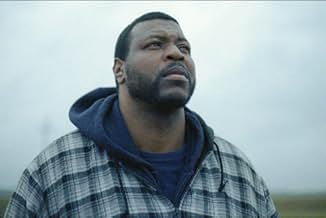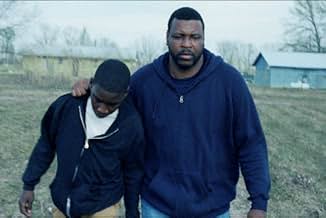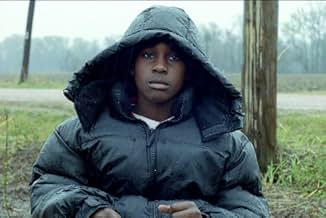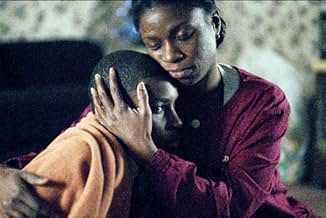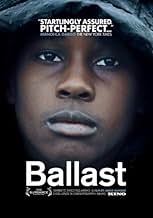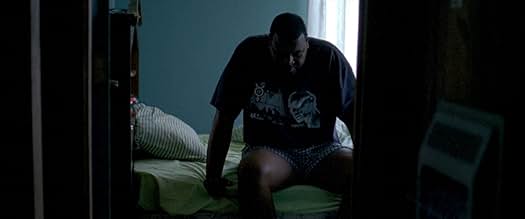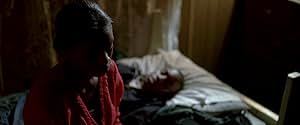IMDb RATING
6.9/10
2.5K
YOUR RATING
A drama set in the Mississippi delta, where one man's suicide affects three people's lives.A drama set in the Mississippi delta, where one man's suicide affects three people's lives.A drama set in the Mississippi delta, where one man's suicide affects three people's lives.
- Awards
- 17 wins & 21 nominations total
Neil Pettigrew
- Dispatcher
- (voice)
Sanjib Shrestha
- Dr. Shrestha
- (as Dr. Sanjib Shrestha)
- Director
- Writer
- All cast & crew
- Production, box office & more at IMDbPro
Featured reviews
We saw this at Sundance 2008, and found it to be deliberately slow, but also quite thoughtful as it told the story of a man whose twin brother's suicide devastates him. The story extends to the dead man's ex wife and son and explores the aftermath of the suicide and its effects on these three characters. What makes this film impressive is that the actors involved in almost every role had never acted before. The director revealed to us at the Q&A session that he had gone to churches in the Mississippi Delta and recruited people to be in his film. Also notable is the sound, or lack thereof. Instead of a busy, noisy soundtrack, this was a quiet film with very little music, relying instead on the ambient noise of the area in which it was filmed. We enjoyed the film and wish the director and the actors much success.
First-time LA-based director Lance Hammer's powerful, naturalistic film seeks to capture what he sees as the prevailing sadness of the Mississippi Delta landscape through its concentrated portrait of a little black family torn by terrible grief and gradually struggling from despair to reconciliation and hope. Ballast begins with a shaky camera shot of a flock of birds flying away across a plain in the Mississippi Delta, then to violent events too fast to grasp completely. A white man, John (Johnny McPhail), comes to the door of a little house to ask Lawrence (Micheal J. Smith Sr.) what's wrong. He won't speak, goes outdoors and a shot rings out. He's shot himself. John calls 911 and Lawrence is rushed to the hospital. For a while this almost looks like an episode of "Cops." The hand-held camera throws the viewer in the heart of all this action with a palpable documentary-style intimacy.
Things cool down a bit as the camera moves over to the house nearby on the same lot where a mother, Marlee (Tara Riggs), lives with her teenage son James (JimMyron Ross). Marlee works in a lousy job cleaning latrines. James is on break from school and pays visits to young drug dealers he owes money to. Rudderless and confused about his dead father, a recent suicide and Lawrence's twin, who never visited him, James turns to desperate and risky behavior that he tries to hide from his mother. The drug dealers pay a threatening visit to James's house.
Back from the hospital Lawrence remains so paralyzed by grief over his brother's suicide perishables are going bad in his little convenience store and he can barely speak, let alone reopen the store and resume normal life. Marlee gets fired from her job and there's no money. James wanders the fields, his only friend perhaps the family dog, the half-wolf Juno. Slowly, the three let out their grievances and begin reconciliation and a solution that involves the property the twins' late father left them and an uneasy cooperation between Lawrence and Marlee.
Hammer's film-making, which got him consideration at the Berlinale and two top prizes for directing and cinematography at Sundance in early 2008, involves a strong camera and meticulous natural sound (with no music), but above all the director's own commitment to humanistic integrity. His various models include Mike Leigh, Charles Burnett, and the Dardennes--Leigh for the attention to family conflicts, Burnett for truth about African-American life, the Dardennes for a method in which the camera literally dogs the footsteps of ordinary people in crisis.
This isn't digital but 35 mm. Technicolor in widescreen, by Lol Crawley, edited by Hammer. Dolby Digital sound designed by Kent Sparling of George Lucas' Skywalker Sound and edited by Julia Shirar (who's worked with Sofia Coppola and Noah Baumbach) was designed by Sam Watson, a Mississippi native, all with close, committed involvement in the project.
Essential to Hammer's approach was to use local people in the main roles and a screenplay whose dialogue was frequently rewritten by the actors who embellished their scenes with improvisation. Even when James' dialogue at some points is nearly inaudible, the sound crew kept that. Though this may be a dubious nod to authenticity, the film is so involving that it hardly leaves the viewer time to think. If this is the Dardennes, it is the Belgian brothers working in top form--save for the ending, which is no resolution or even a question mark, just an abrupt blackout. However, the whole second half of the film is a struggle toward resolution that gives a surprise sense of hope slowly emerging out of what middle-class viewers in particular might tend to see as an utterly hopeless situation.
Seen as part of the San Francisco International Film Festival 2008. To be distributed by IFC Films in late August 2008.
Things cool down a bit as the camera moves over to the house nearby on the same lot where a mother, Marlee (Tara Riggs), lives with her teenage son James (JimMyron Ross). Marlee works in a lousy job cleaning latrines. James is on break from school and pays visits to young drug dealers he owes money to. Rudderless and confused about his dead father, a recent suicide and Lawrence's twin, who never visited him, James turns to desperate and risky behavior that he tries to hide from his mother. The drug dealers pay a threatening visit to James's house.
Back from the hospital Lawrence remains so paralyzed by grief over his brother's suicide perishables are going bad in his little convenience store and he can barely speak, let alone reopen the store and resume normal life. Marlee gets fired from her job and there's no money. James wanders the fields, his only friend perhaps the family dog, the half-wolf Juno. Slowly, the three let out their grievances and begin reconciliation and a solution that involves the property the twins' late father left them and an uneasy cooperation between Lawrence and Marlee.
Hammer's film-making, which got him consideration at the Berlinale and two top prizes for directing and cinematography at Sundance in early 2008, involves a strong camera and meticulous natural sound (with no music), but above all the director's own commitment to humanistic integrity. His various models include Mike Leigh, Charles Burnett, and the Dardennes--Leigh for the attention to family conflicts, Burnett for truth about African-American life, the Dardennes for a method in which the camera literally dogs the footsteps of ordinary people in crisis.
This isn't digital but 35 mm. Technicolor in widescreen, by Lol Crawley, edited by Hammer. Dolby Digital sound designed by Kent Sparling of George Lucas' Skywalker Sound and edited by Julia Shirar (who's worked with Sofia Coppola and Noah Baumbach) was designed by Sam Watson, a Mississippi native, all with close, committed involvement in the project.
Essential to Hammer's approach was to use local people in the main roles and a screenplay whose dialogue was frequently rewritten by the actors who embellished their scenes with improvisation. Even when James' dialogue at some points is nearly inaudible, the sound crew kept that. Though this may be a dubious nod to authenticity, the film is so involving that it hardly leaves the viewer time to think. If this is the Dardennes, it is the Belgian brothers working in top form--save for the ending, which is no resolution or even a question mark, just an abrupt blackout. However, the whole second half of the film is a struggle toward resolution that gives a surprise sense of hope slowly emerging out of what middle-class viewers in particular might tend to see as an utterly hopeless situation.
Seen as part of the San Francisco International Film Festival 2008. To be distributed by IFC Films in late August 2008.
Life is hard for a pimp. It is also hard for a poor mother (Tarra Riggs) to deal with after the suicide of her husband.
The twin/brother-in-law (Micheal J. Smith Sr.) is so depressed that he might just follow his brother, and her youngest (JimMyron Ross ) is heading in the wrong direction. They have a lot to deal with, and the film is about real people and how they deal with life and it's problems and setbacks.
The bleak cinematography really fits this film, as does the lack of a score. There is nothing to dance about, so why have music.
The inexperienced actors really shine, and writer/director Lance Hammer has much to be proud of in his first film.
Truly one of the best films of 2008.
The twin/brother-in-law (Micheal J. Smith Sr.) is so depressed that he might just follow his brother, and her youngest (JimMyron Ross ) is heading in the wrong direction. They have a lot to deal with, and the film is about real people and how they deal with life and it's problems and setbacks.
The bleak cinematography really fits this film, as does the lack of a score. There is nothing to dance about, so why have music.
The inexperienced actors really shine, and writer/director Lance Hammer has much to be proud of in his first film.
Truly one of the best films of 2008.
"Ballast" is an independent film which many critics went "ballistic" with and was even nominated for several Independent Sprit Awards last year. Did it deserve it? No. Should it be ignored? No. "Ballast" stars Tarra Riggs as Marlee, an impoverished black mother living in rural Mississippi trying her best to make ends meat to raise her tweenage son James. James is a young drug addict who goes to extreme measures to support his drug habit. Example: James nonchalantly enters his Uncle Lawrence's home and holds him up at gunpoint to obtain money to purchase the drugs. Lawrence, "The Man From U.N.C.L.E. himself, depressive nature does not make him fight off the rebellious immaturity of James. Lawrence is profoundly grieving the suicide death of his twin brother Darrius, who was married to Marlee and is James' papa; even though Marlee & James despised Darrius because of his desertion of them both. Marlee eventually discovers James unrighteous ways and even loses her job. The desperate Marlee has no choice but to seek the assistance of neighbor Uncle Lawrence even though she has loathed him also because of his brother's actions. What happens next is a commending story of the power of connectivity of people going through harsh times and letting their unforgiving nature behind for the betterment of a child. Therefore, the central fixation is on sacrificing hang-ups in order to help a boy alter his self-destructive habits in order for him to have a promising & hopeful future. The performances of Michael Smith as Lawrence and the aforementioned Riggs as Marlee were authentically solid. Especially Smith's work, who spoke volumes with his non-verbal acting on the internal emotional pain of losing a loved one. JimMyron Ross as James was mediocre at best, but there were signs that with some more thespian training, the young Ross could have a successful acting future. Writer-Director Lance Hammer did nail the character development of the protagonists residing in poverty-stricken small town Mississippi, but I think Hammer screwed it up a bit on orchestrating too many stale & elongated scenes. Kudos does go out to the film's thematic & symbolist cinematography. "Ballast" is a mostly melancholy story which I do not think you will have a "ball" with, but it is a reliable moral narrative on the human nature of resiliency that deserves to be experienced. *** Average
Winner of cinematography and director awards at the Sundance Film Festival and nominated for the Jury Prize at Sundance and Berlin, Lance Hammer's Ballast is an American original. Performed by non-professional actors and shot with a hand-held camera, the film looks at the lives of three distraught people in the Mississippi Delta, conveying with passion their ability to discover their own humanity and transcend the circumstances of their life. Using only the ambient sounds of nature, and portraying events in an elliptical manner that forces us to fill in the blanks, Ballast is reminiscent of the minimalist masterpieces of the Dardennes' and Charles Burnett, but has a unique rhythm all its own.
Shot on 35 mm along the Mississippi Delta, it is a film that quickly establishes mood and suspense and creates an emotional range that travels from anger and sadness to hope and joy. As the film opens, 12 year-old James (JimMyron Ross) chases a flock of birds in an open cotton field during the winter. The camera then shifts to a distraught man, Lawrence (Michael J. Smith, Sr.) sitting alone in his living room in the house next to his sister-in-law, Marlee (Tarra Riggs). The man is paralyzed with depression and unable to communicate due to the death of his brother Darius who, as discovered by a neighbor John (Johnny McPhail), has died in his bed of a self-inflicted overdose. Sullenly, Lawrence responds to the tragedy by going outside and shooting himself in the lungs. Rushed to the hospital, he is badly wounded but recovers after several weeks in the hospital.
In trouble with dope dealers, young James keeps his working mother from discovering that he owes $100 for crack cocaine, but it is revealed when James' TV is taken by the gang and both mother and son are assaulted in their cars. James, who owns a scooter, rides to Lawrence's place and demands his father's money at gunpoint. Things seem to hit rock bottom when Marlee is fired from her job cleaning toilets and Lawrence, still in shock, is unable to reopen his small food market. With nowhere to go but up, the three begin a long process of discovery of their indelible connection to life and to each other.
Unfolding like a documentary, Ballast conveys a sense of immediacy and a lyricism that gathers momentum as the film progresses. Accents are difficult to fathom (the film wisely provides English subtitles), yet there is a naturalism and authenticity here that keeps us engaged throughout. While none of the actors have ever acted before, you would not know it from the power of their performances, especially from Tarra Riggs and young Ross. It is a film, however, that definitely requires patience from the viewer. There are no markers to tell us what we are supposed to feel about the people we see on the screen, yet we remain tuned in to their struggles as if they were our own and in many respects they are. As they discover that who they are is larger than their circumstances, we discover a similar truth in our own life.
Shot on 35 mm along the Mississippi Delta, it is a film that quickly establishes mood and suspense and creates an emotional range that travels from anger and sadness to hope and joy. As the film opens, 12 year-old James (JimMyron Ross) chases a flock of birds in an open cotton field during the winter. The camera then shifts to a distraught man, Lawrence (Michael J. Smith, Sr.) sitting alone in his living room in the house next to his sister-in-law, Marlee (Tarra Riggs). The man is paralyzed with depression and unable to communicate due to the death of his brother Darius who, as discovered by a neighbor John (Johnny McPhail), has died in his bed of a self-inflicted overdose. Sullenly, Lawrence responds to the tragedy by going outside and shooting himself in the lungs. Rushed to the hospital, he is badly wounded but recovers after several weeks in the hospital.
In trouble with dope dealers, young James keeps his working mother from discovering that he owes $100 for crack cocaine, but it is revealed when James' TV is taken by the gang and both mother and son are assaulted in their cars. James, who owns a scooter, rides to Lawrence's place and demands his father's money at gunpoint. Things seem to hit rock bottom when Marlee is fired from her job cleaning toilets and Lawrence, still in shock, is unable to reopen his small food market. With nowhere to go but up, the three begin a long process of discovery of their indelible connection to life and to each other.
Unfolding like a documentary, Ballast conveys a sense of immediacy and a lyricism that gathers momentum as the film progresses. Accents are difficult to fathom (the film wisely provides English subtitles), yet there is a naturalism and authenticity here that keeps us engaged throughout. While none of the actors have ever acted before, you would not know it from the power of their performances, especially from Tarra Riggs and young Ross. It is a film, however, that definitely requires patience from the viewer. There are no markers to tell us what we are supposed to feel about the people we see on the screen, yet we remain tuned in to their struggles as if they were our own and in many respects they are. As they discover that who they are is larger than their circumstances, we discover a similar truth in our own life.
Did you know
- TriviaMicheal J. Smith Sr. (who plays Lawrence) had to be persuaded to make the film as he had no interest in such things. In real life, he works for the Public Services Commission in Yazoo City, Mississippi and was discovered attending his local church.
- ConnectionsReferenced in Film Junk Podcast: Episode 245: Fantastic Mr. Fox (2009)
- SoundtracksI'll Wait For Jesus
Traditional
Arranged by Clora T. Handy & Ann Nichols
Performed by The Canton Gospel Chorus
Courtesy of Talk of the Town Records
Details
Box office
- Budget
- $700,000 (estimated)
- Gross US & Canada
- $77,556
- Opening weekend US & Canada
- $8,572
- Oct 5, 2008
- Gross worldwide
- $81,864
- Runtime
- 1h 36m(96 min)
- Color
- Sound mix
- Aspect ratio
- 2.35 : 1
Contribute to this page
Suggest an edit or add missing content


